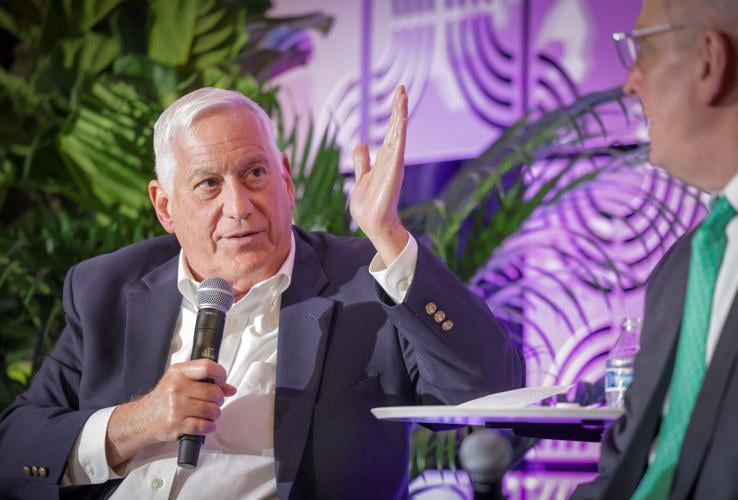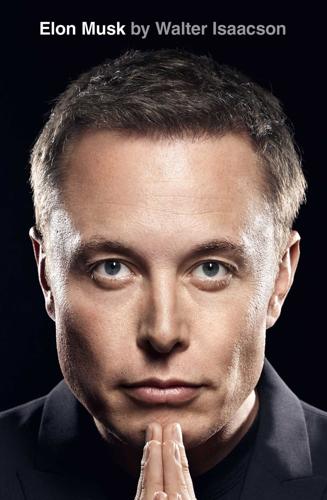Elon Musk, the latest subject of New Orleans author Walter Isaacson, is the world's richest man and perhaps its most controversial. But the publication earlier this month of a highly anticipated biography has turned some of the spotlight on its writer.
In Isaacson's telling, Musk, the founder of Tesla, SpaceX and the new owner of X, formerly Twitter, is a risk-seeking man-child whose upbringing left him with deep scars and a well of cruelty. At the same time, through his determination to advance human progress, he led an electric-vehicle revolution, rebuilt the U.S. aerospace industry and is trying to create a path for artificial intelligence that avoids the end of civilization as we know it.
A former editor of Time magazine and CEO of CNN, Isaacson has a reputation as a conscientious reporter and researcher. But critics and journalists with a dim view of Musk — the ones who see him as dangerous rather than simply heedless and drama-prone — argue that Isaacson's latest work is a flawed portrait. He fell short, they say, by not spelling out to readers what he really thought of his subject.
It's a criticism that Isaacson ably parries. His response, detailed in interviews, podcasts and profiles, is that Musk lovers will think he's too hard on him. Musk haters will think he went too easy and those in the middle should read the book and come to their own conclusions.
'A straightforward narrative'
“He has a lot of fans and a lot of enemies, and my book tries to tell a straightforward narrative,” Isaacson said.
Musk, 52, is Isaacson's most contentious subject, but that wasn't the case when he agreed to take on the biography in 2021. At the time, Musk had successfully launched rockets into orbit and sold more electric cars than all of the world's other automakers combined.
He had made controversial, and in some cases indefensible, Twitter posts, but hadn't yet offered to buy the social-media giant.
In an interview with The Times-Picayune this week, Isaacson, 71, acknowledged that he got a wilder story than he bargained for.
“I thought it was going to be more about rocket ships and electric cars,” said Isaacson, followed by a dry punchline: “It became a more exciting ride.”
A New Orleans promotional tour
The book is already a shoo-in for the top of the bestseller lists. The promotional tour, while focusing mostly on Musk, also has a local flavor.
It's a rare interview where Isaacson, a Broadmoor native, doesn't mention the city he again calls home.
Speaking to CNN's Jake Tapper, he made reference to lagniappe. With podcaster Lex Fridman, he slipped in an aside about a trip to Slidell. His "On with Kara Swisher" podcast appearance referenced crawfish and whiskey — and the New Orleans Book Festival at Tulane. An interview with the Financial Times for the column "Lunch with the FT" took place during a rollicking Friday at Galatoire's.
New York Magazine writer Shawn McCreesh got the full New Orleans treatment for his 6,500-word Isaacson profile. They dined at Lilette, where Isaacson introduced several local notables, then took McCreesh on a driving tour of the city and cooked him red beans and rice. The article's lead picture is an almost gothic portrait of Isaacson standing on a New Orleans sidewalk, clutching a copy of The Times-Picayune.
Isaacson deflected when asked if all the New Orleans references are intentional. "I was at home and they wanted to do a profile," he said of the New York Magazine article. But Cheryl Landrieu, who co-chairs the Book Fest with Isaacson, said there's more to it than that.
“He’s always connecting New Orleans to the outside world, and it’s intentional, and I’ve watched him do it,” said Landrieu, who credits him with expanding the literary festival and reeling in its A-list writers and thinkers.
Meeting with Macron
New Orleans also makes an appearance in the 600-page Musk biography, if only briefly.
In December 2022, Musk held a secret meeting about European hate-speech rules with Emmanuel Macron during the French president's visit to the city.
The trip to New Orleans, mentioned three times in the book, was used by Isaacson to illustrate how wildly Musk bounces from dramas at one company to the next. On the same day, Musk unveiled Tesla's Cybertruck, readied publication of documents known as the Twitter Files and held a meeting with a young engineer that would re-shape the course of Tesla's artificial intelligence projects.
The 'algorithm'
The repercussions of the way Musk stacks together major, company-defining decisions into the span of a few hours is a theme throughout "Elon Musk."
Isaacson's narrative begins as classic biography and accelerates in its final chapters amid Musk's chaotic purchase of Twitter in 2022.
Throughout, it shows Musk's relentless pursuit of what he calls his "algorithm," a theory that parts, processes and businesses must be streamlined as much as possible. All the while, Musk moves from periods of manic excitement to brooding lows that leave family members and employees struggling in his wake.
Isaacson's critics are right that he failed to conclude whether the comic-loving Musk is more superhero or supervillain. But his views seem to leak out in the comments of others, particularly the sympathetic portraits of Musk employees who have run-ins with their boss.
One of them, a young financial analyst named Lucas Hughes, is brutalized by Musk for not having all of the pricing details on hand for one of SpaceX's rocket engines. He leaves the company soon after.
"Elon cares a lot about humanity, but humanity in more of a very macro sense," Hughes said.
That's not exactly the philosophy of a superhero.
Walter Isaacson will discuss “Elon Musk” at the Nims Fine Arts Center on the Academy of the Sacred Heart campus on Oct. 4, at the New Orleans JCC on Oct. 5 and in McAlister Auditorium at Tulane University on Oct. 18.


